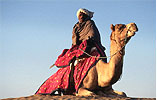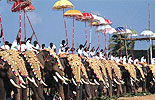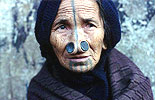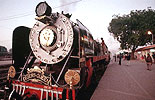Urs Ajmer Sharif
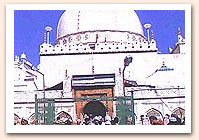
The
urs, acommomerative celebration is held in the solemn memory of Khwaja Muin-nddin
Chisti, a prighly respected sufi saint fondly revered as the benefactor of the
poor, popularly known as Gareeb Nawaz. The Dargah Sharif in Ajmer, is the place
where the Saints mortal remains lie burried and is the site of the largest Muslim
Fair in India.
Chadar; Ghilaph & Neema which are votive offerings for the tomb are offered
by several hundred thousand devotees. Mehfils & Qawwalis are held and mass
prayer calls for the eternal peace of the mankind. An interesting ritual is
the looting of Kheer (Milk Pudding) which is cooked in two large cauldrons called
Degs and distributed to the devotees as tabarruk (blessed food).
The lakeside city of Ajmer is located in central Rajasthan, and is held in great
reverence by devotees of all communities who call it 'Ajmer Sharif' (Holy Ajmer).
It is here that the mortal remains of the highly respected Sufi saint Khwaja
Moin-ud-din Chishti lie buried.
The Khwaja came from Persia and established the Chishtia order of fakirs in
India. He is popularly known as Gharib Nawaz (protector of the poor) because
he dedicated his entire life to the service of mankind. His spartan life spanned
almost a hundred years and he embraced death in solitude while he had withdrawn
to his cell for six days, asking not to be disturbed.
The Dargah Sharif in Ajmer is the place where the Saint's mortal remains lie
buried and is the site of the largest Muslim fair in India. More than five lakh
devotees belonging to different communities gather from all parts of the subcontinent
to pay homage to the Khwaja on his Urs (death anniversary) during the first
six days of Rajab (seventh month of the Islamic calendar.)
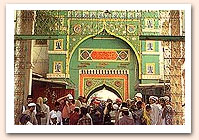
The pilgrims who come to seek the blessings of the Khwaja make rich offerings
called nazrana at the holy spot where the saint has been entombed. The offerings
of rose and jasmine flowers, sandalwood paste, perfumes and incense contribute
to the fragrance that floats in the air inside the shrine. Also offered by devotees
are the chadar, ghilaph and neema, which are votive offerings for the tomb.
These are brought by devotees on their heads and handed over to the khadims
inside the sanctum sanctorum. Outside the sanctum sanctorum of the dargah, professional
singers called qawwals in groups and sing the praises of the saint in a characteristic
high pitched voice. People gather around them and listen attentively, sometimes
clapping to the rhythm of their instruments.
The Urs is initiated with the hoisting of a white flag on the dargah by the
Sajjada Nashin (successor representative) of Chishtis. It is done on the 25th
of Jamadi-ul-Akhir (sixth lunar month), with the accompaniment of music. On
the last day of the sixth month, the Jannati-Darwaza (gateway of heaven) is
flung open early in the morning. People cross this gate seven times with the
belief that they will be assured a place in heaven. On the 1st of Rajab, the
tomb is washed with rose water and sandalwood paste and anointed with perfumes.
This ritual is called ghusal. The tomb is then covered with an embroidered silk
cloth by the Sajjada Nashin.
An interesting ritual is the looting of kheer (milk-pudding) which is cooked
in two large cauldrons called degs and distributed to the devotees as tabarruk
(blessed food).
On the 6th of Rajab, after the usual mehfil and the sound of cracker-bursts
accompanied by music, the Sajjada Nashin performs the ghusal of the tomb. Fatiha
and Salamti are read. A poetic recitation called mushaira is arranged in which
poets of all communities arrive to recite compositions dedicated to the Khwaja.
The Qul (end-all) on the 6th of Rajab marks the end of the Urs.
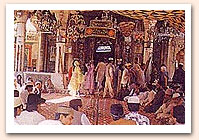
At night, religious assemblies called mehfils are held in the mehfil-khana,
a large hall meant for this purpose. These are presided over by the Sajjada
Nashin of the dargah.
Qawwalis are sung and the hall is packed to capacity. There are separate places
reserved for women who attend the mehfil. The mehfil terminates late in the
night with a mass prayer for the eternal peace of the Khwaja in particular and
mankind in general.
The Dargah is located at the conjunction of three bazaars. There are a number
of restaurants around the Dargah where visitors can choose from a variety of
dishes most of which are non-vegetarian preparations. Guest houses on the road
leading to the Dargah offer accommodation that ranges from economical to luxurious.
Many other guest houses are strewn across the city. The shops in the market
around the Dargah sell flowers, prayer mats, rosaries, textiles, and general
merchandise as well.
Ajmer is 132 kms. south-west of Jaipur and 198 kms. east of Jodhpur. It is connected
by road to Jaipur, Jodhpur, Bikaner, Udaipur and Kota. Ajmer is a railway junction
on the Delhi-Ahmedabad section of the Western Railway. During the Urs, special
buses ply from cities all over India carrying people to Ajmer and back.
··» Fairs
& Festivals in India —› Nagaur
Fair, Nagaur —› Baneshwar
Fair, Dungarpur —›
Gangaur Festival, Jaipur —›
Banganga Fair —›
Brij Festival —›
Camel Festival —›
Desert Festival —›
Ganesh Chaturthi —›
Kaila Devi Fair —›
Shekhawati Fair —›
Teej Festival —›
Pushkar Fair —›
Mewar Festival, Udaipur —›
Elephant Festival, Jaipur —›
Urs Ajmer Sharif
—› Summer Festival,
Mount Abu










 The
urs, acommomerative celebration is held in the solemn memory of Khwaja Muin-nddin
Chisti, a prighly respected sufi saint fondly revered as the benefactor of the
poor, popularly known as Gareeb Nawaz. The Dargah Sharif in Ajmer, is the place
where the Saints mortal remains lie burried and is the site of the largest Muslim
Fair in India.
The
urs, acommomerative celebration is held in the solemn memory of Khwaja Muin-nddin
Chisti, a prighly respected sufi saint fondly revered as the benefactor of the
poor, popularly known as Gareeb Nawaz. The Dargah Sharif in Ajmer, is the place
where the Saints mortal remains lie burried and is the site of the largest Muslim
Fair in India.

